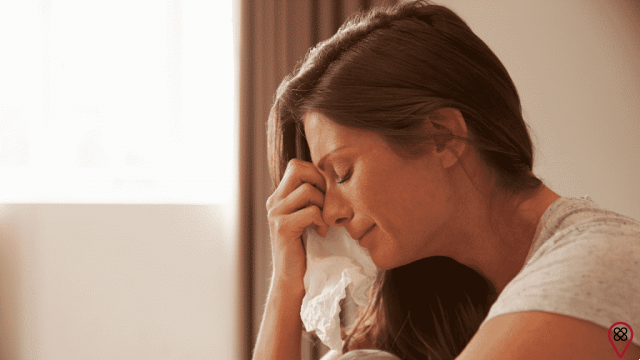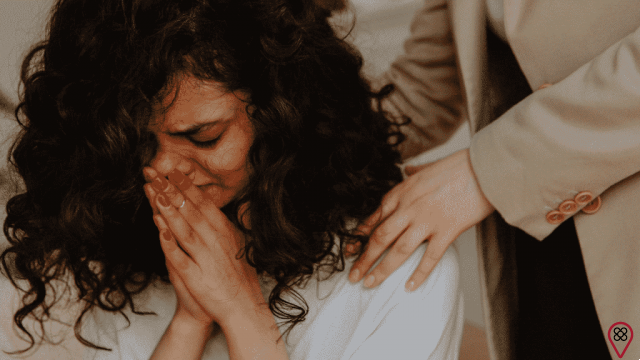The “closed” throat, the eyes filling up with water, the realization that we are no longer in control of our emotions… These are some of the signs that we are about to cry, and you have certainly been there. Although these indications that we are about to burst into tears are similar for everyone, the reasons that lead us to cry are quite individual.
This means that while some people hardly ever cry, others cry quite often and for whatever reason. While crying, especially in public, can be uncomfortable, crying is viewed differently in different cultures, depending on who is crying and why. In our culture, the Western one, it is common for the prejudice to be spread that men crying are considered “less men” and “weak”, while women, when they cry, are “just doing what women do”, since they are considered dramatic.
In Eastern culture, using Japan as an example, it is common for both men and women to cry when making apologies. Another example: there are records that, at the funeral of the Viking warrior Rollo, who came to live in France and incorporated himself into French ways, tens of thousands of warriors wept without any shame. Finally, one more example: in the Nigerian tiv tribe, fathers and mothers cover the mouths and nostrils of babies when they cry and laugh at older children when they shed tears, because crying is seen as a sign of weakness among them.
We have prepared an article that aims to explain the main information about crying and its function. Check out:
The function of crying
In short, the function of crying is to express discomfort, whether physical or emotional - and here is an explanation of the two different types of crying.

The first type of crying is that which is stimulated by some physical reaction. You know when you hit your little toe on a corner or get hit very hard, to the point of tearing up? This is nothing more than a defense of the body, which sheds pain or discomfort through tears, since the lacrimal gland, which produces crying, contracts in the face of some stimuli from the independent nervous system, responsible for "processing" the pain.
The second, more well-known type of crying is emotional crying, which happens when strong emotions take hold of us—whether bad, such as sadness, depression, and longing, or good, such as joy, relief, and happiness. The function of crying, in this case, is to express that the emotion is really very intense. Little is known about why the body "chooses" tears as a way to show strong emotions, but that's how it works for most people.
What does crying mean in Psychology?
There are two main theories about crying for Psychology, although each case is quite particular and, for this reason, each person deserves to be analyzed individually. The first theory is that crying is an overflow, a way for the body to physically and tangibly expose what it is feeling. In addition, there is scientific evidence that crying promotes stress relief, so in addition to expressing strong emotions, it helps us deal with them.
The second theory is that crying may be a symptom. People who go through depression, for example, tend to cry often or even uninterruptedly for hours - and the worst: for no reason. Therefore, crying can often be a symptom of a bigger problem, such as depression, anxiety disorder, or panic disorder. Therefore, it is necessary to follow up with a psychotherapist.
Why do I cry easily?
If you came to this article looking for an accurate answer to this question, we are sorry to disappoint you, but there is simply no possible explanation for it. In the same way that Psychology has already confirmed that our personalities are unique and individual, crying is also proven to be a unique expression for each individual. So the reasons that make me cry are different from the reasons that make you cry, as is the frequency with which tears fall from our eyes.

There are people who are very serious and emotionally mature who cry often, while there are people who are unstable in their emotions and very immature who are unlikely to cry. So know that this is an individual reaction, and unless it's a symptom of a health problem like depression, don't worry too much about it. If you cry a lot, it could just be your body's way of expressing its emotions.
Is crying good?
Unless your crying is frequent and/or excessive, which could indicate a health problem, there is no harm in crying. According to psychiatrist Victor Bigelli de Carvalho, who works at Hospital Israelita Albert Einstein, in São Paulo, crying has the function of practically bringing balance to our emotional state: “Crying has the function of managing our stress and making the body enters homeostasis, that is, its situation of balance”, he said, in an interview with the Viva Bem website, from UOL.
According to the doctor, human beings feel a natural need to express their emotions in some way, so many find crying a way to do that.
Why do we cry when we are angry?
As already explained in this article, the reasons that make a person cry are quite individual. So while crying out in anger is common practice for some people, it can be an experience other people will never go through. And if it is an individual experience, the reasons that cause this type of crying are also. But, in addition to that, there are some reasons that can help trigger crying out of anger.

The first one is that crying is often used by our body as a way of expressing despair and the need to ask for help, reasons that normally make us cry, since it would be a way in which our body would be asking for that emotional stress to reach the The end.
In addition, crying is a reaction that causes empathy, since our reaction, when we see someone crying, is usually to welcome and care. In this way, the body can end up crying in situations of anger to “ask” for empathy from someone with whom we are in conflict, or even request help from those around us.
How to control emotional crying?
We have given several examples here of how crying is beneficial and, in some cases, essential for us, so controlling the crying caused by our emotions may not be the most recommended. Also according to Victor, if we do not allow our crying to “flow”, this accumulated stress will probably manifest itself in another way, such as through an aggressive or self-destructive posture.
So the recommendation is that you don't "hold" your crying or try to avoid it. Instead, allow it to flow freely, because it will bring relief, even immediate, to your stress.
You may also like
- See what it means to dream of a person crying
- Dig deeper into why crying is good
- Learn what to do to help a child stop crying
When you realize that you are going to cry in public and you feel embarrassed about it, try to surround yourself with people you trust and who will welcome you and try to reduce your emotional suffering caused by this uncomfortable situation.
As we have seen, therefore, crying is something that does no harm and can even be very positive for our emotional state, as it produces a feeling of relief and overflow. Let us, therefore, stop seeing crying as a sign of weakness and start seeing it as a sign of someone brave, who is not ashamed to admit and recognize their vulnerabilities.

























